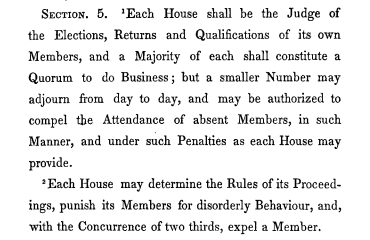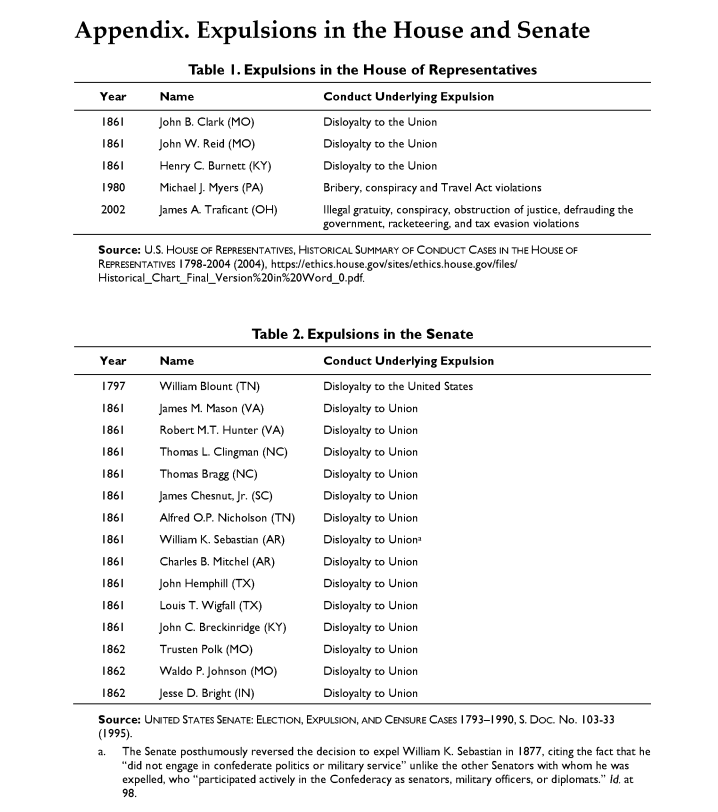On December 1, 2023, George Santos was expelled from the House of Representatives by a 311-114 vote, telling reporters, “To hell with this place!” as he exited the United States Capitol for the final time. It was a dramatic moment, fitting for such a rare occasion—expulsion is the most severe disciplinary act in Congress, and only 21 members in history have ever been expelled. So how exactly does a lawmaker get expelled from Congress? And what happens now? Let’s dive into HeinOnline to learn more about congressional disciplinary action.

Constitutional Consequences
The ability to dismiss a member of Congress comes straight from the Constitution—more specifically, Article I, Section 5, Clause 2: “Each House [of Congress] may determine the Rules of its proceedings, punish its members for disorderly behavior, and, with the concurrence of two-thirds, expel a member.”[1]William Hickey. Constitution of the United States of America, with an Alphabetical Analysis; the Declaration of Independence; the Prominent Political Acts of George Washington; Electoral Votes for All the Presidents and Vice-Presidents; the … Continue reading

However, the Constitution doesn’t state any specific rules as to when a congressional member should be expelled; therefore, it is up to each chamber to determine the behaviors that will and will not be tolerated.
Expulsion isn’t the only disciplinary action. Congress can also vote to censure a member,[2]9 (January 25, 2005) Expulsion, Censure, Reprimand, and Fine: Legislative Discipline in the House of Representatives. This document can be found in HeinOnline’s U.S. Congressional Documents database. which acts as an official sanction. They can also choose to exclude a member,[3]1 1 (November 7, 2023) Expulsion of Members of Congress: Legal Authority and Historical Practice. This document can be found in HeinOnline’s U.S. Congressional Documents database. which means that they refuse to seat a member-elect. Both censuring and exclusion only require a majority vote, which makes them more common than expulsion, which requires a two-thirds vote. Additionally, members can be fined[4]13 (January 25, 2005) Expulsion, Censure, Reprimand, and Fine: Legislative Discipline in the House of Representatives. This document can be found in HeinOnline’s U.S. Congressional Documents database. and/or denied or removed from seats on committees.
Alleged misconduct by a congressperson is investigated by either the House or Senate’s ethics committee. Rule XI (Procedures of committees and unfinished business) of the Rules of the House of Representatives states that the Committee on Standards of Official Conduct can investigate allegations that a Member violated “any law, rule, regulation, or other standard of conduct applicable to the conduct of such Member … in the performance of his duties or the discharge of his responsibilities.”[5]2023 Constitution, Jefferson’s Manual and Rules of the House of Representatives of the United States, One Hundred Eighteenth Congress 349 (2023). This document can be found in HeinOnline’s World Constitutions Illustrated database. The investigation will usually include collecting evidence, interviewing witnesses, and holding hearings. Based on the findings of the investigation, a vote may be held to determine a course of action.
An Examination of Past Expulsions
Twenty-one members of Congress, including George Santos, have been expelled in American history—15 from the Senate, and six from the House of Representatives. Seventeen out of 21 of these members were expelled for supporting Confederate states during the civil war. One of the expulsions was posthumously reversed.
The other congressional members who were expelled were:
- Michael “Ozzie” Myers,[6]11 J.L. & POL. 419 (1995). This article can be found in HeinOnline’s Law Journal Library. a Pennsylvania Democrat expelled from the House of Representatives in 1980 for participating in the infamous FBI sting operation called ABSCAM, which caught several influential politicians collecting bribes from a fake Arab sheikh.
- James Traficant Jr.,[7]Cathren Page, An Unusual Suspect? Unreliable Narrators in Fiction and Law, 9 BERKELEY J. ENT. & SPORTS L. 1 (2020). This article can be found in HeinOnline’s Law Journal Library. an Ohio Democrat expelled in 2002 after he was convicted of bribery and racketeering.
No senator has been expelled since the Civil War. Bob Packwood,[8]I (1995) Documents related to the investigation of Senator Robert Packwood / Select Committee on Ethics, United States Senate, One Hundred Fourth Congress, first session. This document can be found in HeinOnline’s U.S. Congressional Documents … Continue reading an Oregon Republican, was almost expelled in 1995 for sexual harassment, and New Jersey Democrat Harrison Williams[9]Henry Biggs, Suppuration of Powers: Abscam, Entrapment and the Politics of Expulsion, 6 LEGIS. & POL’y BRIEF 248 (2014). This article can be found in HeinOnline’s Law Journal Library. was also caught in the ABSCAM scandal. However, both senators resigned before they could be expelled. All senators who have been expelled were dismissed for supporting the Confederacy, except for one who was removed in 1789 for treason.

This isn’t to say that other congressional members haven’t committed crimes worthy of expulsion. However, a vast majority of them resign before getting expelled to avoid additional shame—similar to presidents resigning before being impeached.
The Santos Scandal
Suspicions about George Santos, Republican from New York, began when the New York Times in November 2022 reported that he had lied about a number of details to the public and potential donors,[10]H. Rept. 118-274 22 (2023-11-17) IN THE MATTER OF ALLEGATIONS RELATING TO REPRESENTATIVE GEORGE SANTOS. This document can be found in HeinOnline’s U.S. Congressional Documents database. including:
- His college degrees: He has claimed he has a bachelor’s from Baruch College and an MBA from New York University (he has neither).
- His career: Most of the jobs on his resume have been fabricated, including positions at Citigroup and Goldman Sachs.
- His Jewish ancestry: Despite previous claims that he had Jewish heritage, Santos is actually Catholic, and he later said that he always meant he was “Jew-ish.”
- His mother: He has said that his mother survived and then died from effects of the 9/11 terrorist attacks—records found that she was living in Brazil at the time.
- Being mugged: Santos has claimed to be the victim of muggings, but no evidence exists to prove these claims.
Ritchie Torres and Dan Goldman, both Democrat representatives from New York, filed a complaint against Santos with the House Ethics Committee in January 2023 to investigate his delinquent financial disclosure reports. In May of 2023, Santos was charged with 23 felonies, including wire fraud, money laundering, and theft of public funds. He has been accused of spending his campaign money for personal profit, including using the money on debt, casinos, Botox, OnlyFans subscriptions, and trips to Atlantic City and Las Vegas. Santos has denied all of these charges and will eventually go on trial. After the indictment, several House Democrats introduced a resolution to expel Santos.
Because Santos hasn’t officially been charged with a crime, some lawmakers were hesitant to expel him—generally, expulsions have only occurred after a conviction or a trial. However, the House ethics committee determined that Santos had “sought to fraudulently exploit every aspect of his House candidacy for his own personal financial profit.”
Representative Santos sought to fraudulently exploit every aspect of his House candidacy for his own personal financial profit.
He blatantly stole from his campaign.
He deceived donors into providing what they thought were contributions to his campaign but were in fact payments for his personal benefit.
He reported fictitious loans to his political committees to induce donors and party committees to make further contributions to his campaign — and then diverted more campaign money to himself as purported “repayments” of those fictitious loans.
He used his connections to high value donors and other political campaigns to obtain additional funds for himself through fraudulent or otherwise questionable business dealings.
And he sustained all of this through a constant series of lies to his constituents, donors, and staff about his background and experience.
Despite any hesitancies, after two failed votes, the House voted to expel Santos with a 311-114 vote, with 206 Democrats and 105 Republicans in favor of the dismissal.
What Happens Now?
Now that Santos has been expelled, he can no longer vote on any legislation, nor will he have access to government health benefits or a congressional legislative pension. However, he hasn’t lost all of his perks—former members of Congress can still take out materials from the Library of Congress, use the Capitol building gym, and eat at the House restaurant. Santos’s congressional staff will continue working, supervised by the House clerk, until someone is elected to replace him.
New York Governor Kathy Hochul has set the date for the special election to replace Santos for February 13th. The two candidates competing for the position are former Representative Tom Suozzi (D) and Mazi Melesa Pilip (R), a former Israeli army soldier and currently a county legislator.
Expel Misinformation with HeinOnline
Scholars never have to worry about lies, fraud, or deceit when they’re researching in HeinOnline—our databases contain reputable scholarly articles, government documents, case law, and more, all searchable as image-based PDFs that are exact replicas of the print original. With the wealth of primary and secondary sources you’ll find when exploring HeinOnline, you can trust that your research will always be backed by facts!
And if you are interested in more posts exploring the nitty-gritty of government, the complexities of politics, and the hidden gems of history, be sure to subscribe to the HeinOnline Blog and each new post delivered straight to your inbox!
HeinOnline Sources[+]
| ↑1 | William Hickey. Constitution of the United States of America, with an Alphabetical Analysis; the Declaration of Independence; the Prominent Political Acts of George Washington; Electoral Votes for All the Presidents and Vice-Presidents; the High Authorities and Civil Officers of Government, from March 4, 1789, to March 3, 1847; Chronological Narrative of the Several States; and Other Interesting Matter; with a Descriptive Account of the State Papers, Public Documents, and Other Sources of Political and Statistical Information at the Seat of Government (2). This document can be found in HeinOnline’s World Constitutions Illustrated database. |
|---|---|
| ↑2 | 9 (January 25, 2005) Expulsion, Censure, Reprimand, and Fine: Legislative Discipline in the House of Representatives. This document can be found in HeinOnline’s U.S. Congressional Documents database. |
| ↑3 | 1 1 (November 7, 2023) Expulsion of Members of Congress: Legal Authority and Historical Practice. This document can be found in HeinOnline’s U.S. Congressional Documents database. |
| ↑4 | 13 (January 25, 2005) Expulsion, Censure, Reprimand, and Fine: Legislative Discipline in the House of Representatives. This document can be found in HeinOnline’s U.S. Congressional Documents database. |
| ↑5 | 2023 Constitution, Jefferson’s Manual and Rules of the House of Representatives of the United States, One Hundred Eighteenth Congress 349 (2023). This document can be found in HeinOnline’s World Constitutions Illustrated database. |
| ↑6 | 11 J.L. & POL. 419 (1995). This article can be found in HeinOnline’s Law Journal Library. |
| ↑7 | Cathren Page, An Unusual Suspect? Unreliable Narrators in Fiction and Law, 9 BERKELEY J. ENT. & SPORTS L. 1 (2020). This article can be found in HeinOnline’s Law Journal Library. |
| ↑8 | I (1995) Documents related to the investigation of Senator Robert Packwood / Select Committee on Ethics, United States Senate, One Hundred Fourth Congress, first session. This document can be found in HeinOnline’s U.S. Congressional Documents database. |
| ↑9 | Henry Biggs, Suppuration of Powers: Abscam, Entrapment and the Politics of Expulsion, 6 LEGIS. & POL’y BRIEF 248 (2014). This article can be found in HeinOnline’s Law Journal Library. |
| ↑10 | H. Rept. 118-274 22 (2023-11-17) IN THE MATTER OF ALLEGATIONS RELATING TO REPRESENTATIVE GEORGE SANTOS. This document can be found in HeinOnline’s U.S. Congressional Documents database. |



